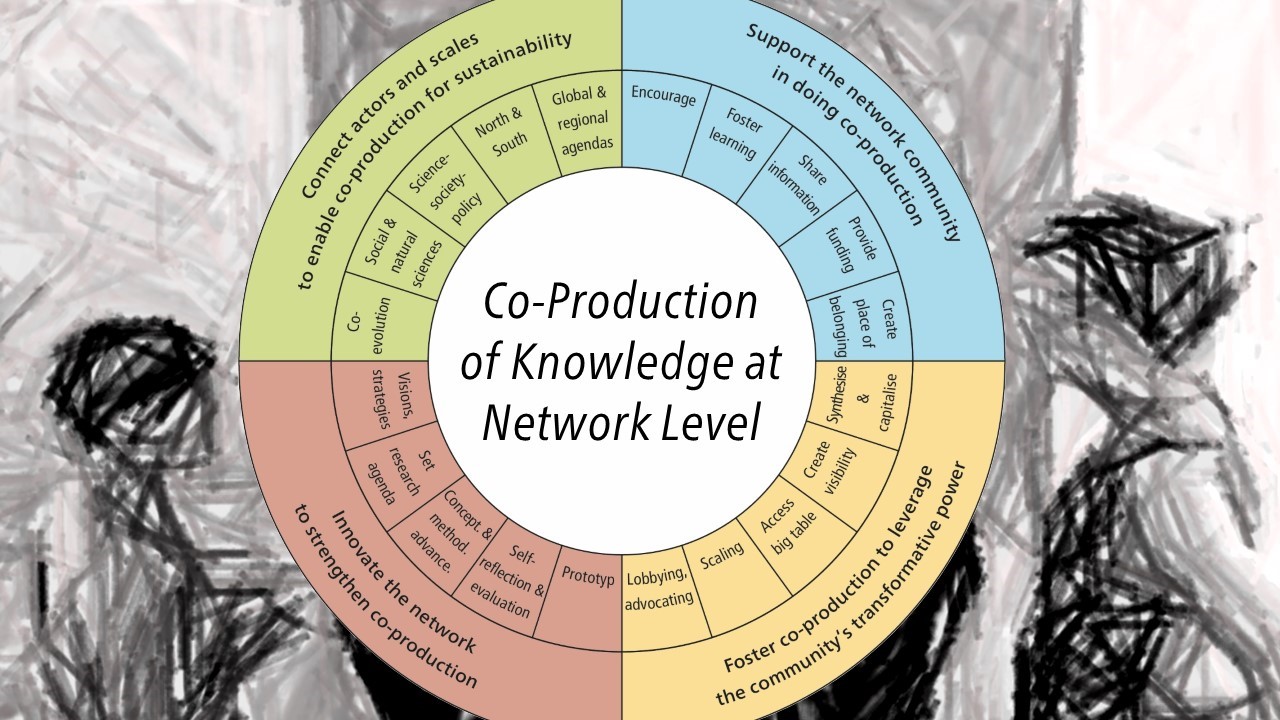
Co-producing knowledge and action means that various actors jointly generate context-specific knowledge and pathways to sustainable futures. It is an alternative model to more classical forms of science-society interaction, where science is assumed to generate new knowledge that society then acts on. Since sustainability problems are often too complex and contested for individual disciplines to generate solutions on their own, the co-production of knowledge and action is a promising way forward as it makes it possible to combine diverse types of knowledge from both, different disciplines and practice.
Sustainability-oriented research networks such as Future Earth are formations linking actors from science, policy and society across geographical scales or sectors in order to promote collaboration in producing knowledge and/or action for sustainability. Such networks are usually organized around a kind of ‘support entity’ (e.g. a secretariat or steering committee) helping the network members to achieve their jointly defined mission. This mission, but also a network’s governance philosophy and related activities differ between networks. Some networks focus on research, while others are more interested in turning knowledge into action. Despite their diverse missions, philosophies and structures, networks share certain functions and capacities that differ from those of individual organizations, such as universities or research projects. In the case of knowledge co-production, networks are particularly useful in their functions of, for example, flexibly connecting different actors, joining forces or disseminating information.
The network compass represents an important starting point for structuring a process of systematic reflection on how networks can contribute in various ways to co-production and sustainability transformations. The methodology was developed through a reflection and learning process undertaken with different partner networks of Future Earth such as GLP, GMBA, BioDiscovery, MRI, PAGES and ITD Alliance to better understand how global research networks can be more effective and collaborative in contributing to sustainable development.

The network compass supports networks in thinking critically about the role of co-production in the pursuit of their mission and how they can improve its related potential. With the aid of the compass, networks can analyse the diverse ways in which they promote co-production – for example, through individual network members in specific contexts, through the community of network members together and/or through the support entity of the network.
So far, the network compass has been applied for the following purposes:
Since incorporation of co-production processes can be a challenging task requiring novel, untested strategies and fundamental transformations of the networks themselves, learning within and between networks is crucial.
The network compass offers an iterative, step-by-step approach to help networks systematically reflect on and foster co-production processes.
As a first step, networks define their mission and sustainability goals. In a second step, activities that cater to the defined mission and goals need to be identified. Here, the network compass offers four generic fields of action that can be used for systematic reflection:
Action field 1: Connecting different actors and scales to enable co-production
Networks may ask themselves: To achieve our mission, do we (aim to) convene actors across disciplines, sectors of society, places and scales? And by that, do we (aim to) build a community that engages in co-production of knowledge and action? Then specific related activities, e.g. organizing conferences or workshops, can be identified.
Action field 2: Supporting the network members in co-production
Networks may ask themselves: How can we help our members implement co-production in their contexts? Specific activities could include providing information, training courses and funding opportunities.
Action field 3: Fostering co-production to leverage a network’s transformative power
Networks may ask themselves: How can we funnel our members’ efforts to become stronger collectively? Relevant activities would be coordinating synthesis reports, increasing the visibility of the community, or contributing input to high-level policy processes.
Action field 4: Innovating in the network to strengthen co-production
Networks may ask: What innovations are needed to strengthen the network’s capacity to engage in co-production? Relevant activities would be self-reflection, vision development, or prototyping novel co-production approaches.
When identifying these activities, it might be helpful to first focus on re-considering the significance of existing activities and then to discuss what other activities might be important moving forward.
Once these activities have been identified, the third step is to scrutinize them in terms of their potential to effectively achieve the network’s sustainability goals. Here, the networks may critically ask themselves why they believe that the identified activities contribute to sustainability. Possible questions for reflection might range from revisiting the problem diagnoses, knowledge gaps and context conditions, up to potential barriers or required resources and skills. Depending on the results of these reflection processes, the networks might adapt their existing strategies (e.g. stronger emphasis on innovations within their networks), and/or change their activity portfolio (e.g. introducing vision development or training activities).
The network compass can be a key tool for sustainability-orientated research networks to exploit their potential for co-production. It can be used to evaluate past sustainability activities as well as for strategic future planning and thereby strengthening the processes of co-production.

Read the full article:
Flurina Schneider, Theresa Tribaldos, Carolina Adler, Reinette (Oonsie) Biggs, Ariane de Bremond, Tobias Buser, Cornelia Krug, Marie-France Loutre, Sarah Moore, Albert V Norström, Katsia Paulavets, Davnah Urbach, Eva Spehn, Gabriela Wülser, Ruben Zondervan, Co-production of knowledge and sustainability transformations: a strategic compass for global research networks, Current Opinion in Environmental Sustainability, Vol. 49, 2021, pp. 127-142.
This review comes from a themed issue of Current Opinion in Environmental Sustainability on The state of knowledge on social transformations to sustainability.
This blog was originally posted on Soziale Ökologie.
Header image: The network compass, by Flurina Schneider,